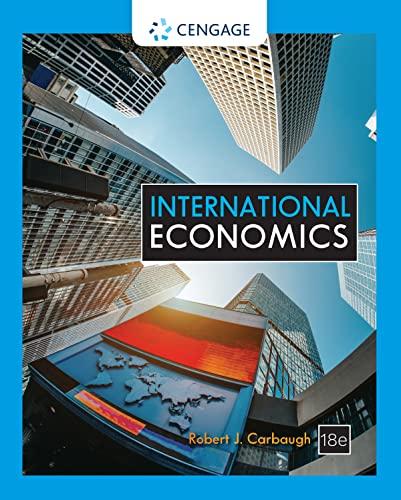In your principles of macroeconomics course, you learned about crowding out in the domestic economy. Crowding out
Question:
In your principles of macroeconomics course, you learned about "crowding out" in the domestic economy. Crowding out refers to private consumption or investment spending decreasing as a result of increased government expenditures and the subsequent budget deficits. The source of the decline in private spending is higher interest rates caused by budget deficits.
Suppose that the government enacts an expansionary fiscal policy, say, an increase in defense spending. The policy must be financed either by increased taxes or through the borrowing of funds to permit the enlarged federal deficit. If the government borrows funds, the total demand for funds will increase as the government competes with the private sector to borrow the available supply of funds. The additional government borrowing increases the total demand for funds and pushes up interest rates. Because of higher interest rates, businesses will delay or cancel purchases of machinery and equipment, residential housing construction will be postponed, and consumers will refrain from buying interest sensitive goods, such as major appliances and automobiles. The higher interest rates caused by government borrowing squeeze out private sector borrowing. Crowding out lessens the effectiveness of an expansionary fiscal policy.
Although economists tend to accept the logic of the crowding out argument, they recognize that government deficits don’t necessarily squeeze out private spending. In recessions, the main problem is that people are not spending all of the available funds. Typically, consumers are saving more than businesses intend to invest. Such a shortage of spending is the main motivation for increased government spending. In this recessionary situation, deficit-financed government spending doesn't crowd out private spending.
The extent of crowding out tends also to be lessened in an open economy with capital flows. This is because inflows of capital from abroad tend to keep interest rates lower than they otherwise would be. The government can borrow more money without forcing up interest rates that crowd private borrowers out of the market. The experience of the United States during the first decade of the 2000s casts doubt on the crowding out hypothesis. Despite growing federal budget deficits, interest rates remained low in the United States as foreigners were content to purchase huge amounts of securities issued by the government. Analysts noted that if not for the inflow of foreign capital, U.S. interest rates would be about 1.5 percentage points higher. Skeptics noted that the free spending policy would eventually have to cease if foreigners begin to doubt the ability of the United States to repay its debt with sound currency. This doubt would cause foreign investors to demand higher interest rates if they were to keep lending the United States the money it needs, or they might simply stop lending to the United States, thus making the crowding out more likely.
What do you think? Is crowding out a major problem for our economy?
Step by Step Answer:






